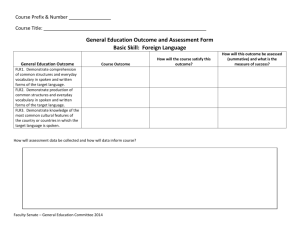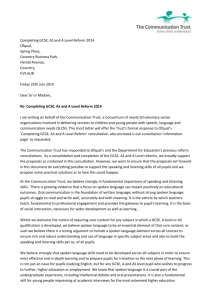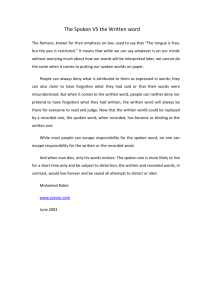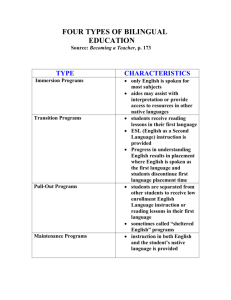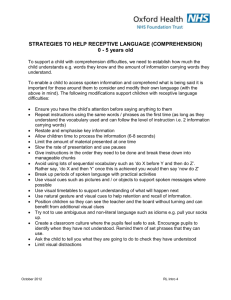Responding to the consultation
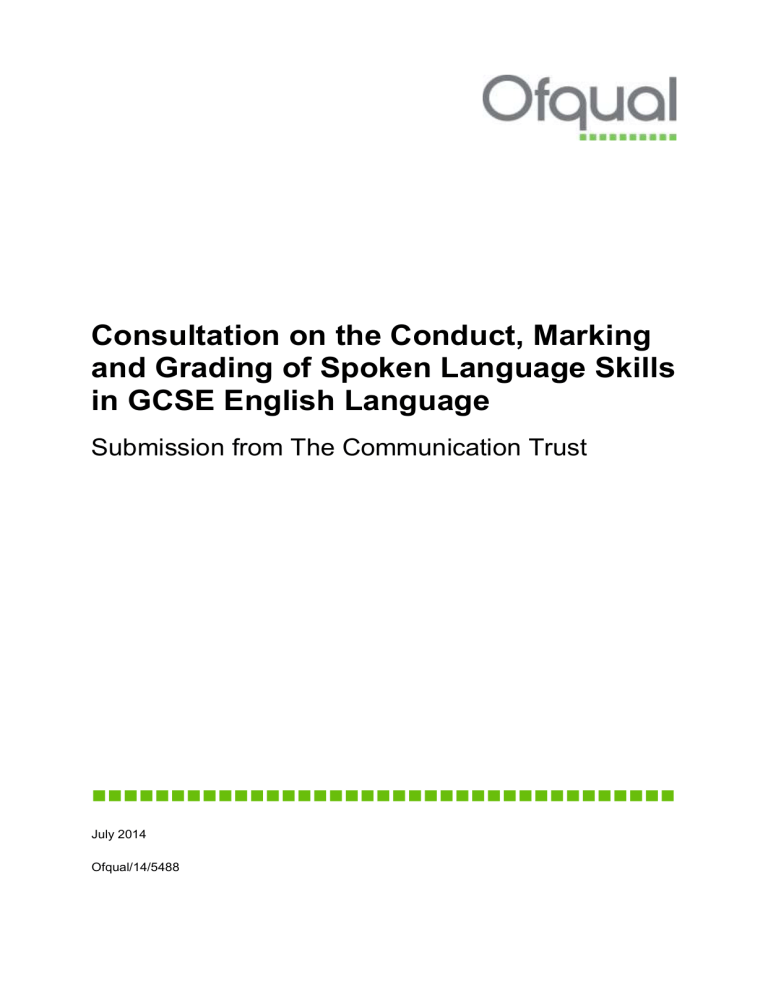
Consultation on the Conduct, Marking and Grading of Spoken Language Skills in GCSE English Language
Submission from The Communication Trust
July 2014
Ofqual/14/5488
Consultation on the Conduct, Marking and Grading of Spoken Language Skills in
GCSE English Language
Responding to the consultation
About you
Name: Anne Fox
Position: Director
Name of organisation or group (if applicable):
The Communication Trust
Address: 8 Wakley Street, London, EC1V 7QE
Email:
Telephone number: jbolton@thecommunicationtrust.org.uk
0207 843 2526
Would you like us to treat your response as confidential?* If you answer yes, we will not include your details in any list of people or organisations that responded to the consultation.
( ) Yes ( X ) No
Are the views you express on this consultation an official response from the organisation you represent or your personal views?*
( ) Personal views
( X ) Official response from an organisation/group (please complete the type of responding organisation tick list)
If you ticked “Personal views”, which of the following are you?
( ) Student
( ) Parent/carer
( ) Teacher (but not responding on behalf of a school or college)
( ) Other (including general public) (please state capacity) _____________________
If you ticked “Official response from an organisation/group”, please respond accordingly:
Ofqual 2014 2
Consultation on the Conduct, Marking and Grading of Spoken Language skills in
GCSE English Language
Type of responding organisation*
( ) Awarding organisation
( ) Local authority
( ) School/college (please complete the next question)
( ) Academy chain
( ) Private training provider
( ) University or other higher education institution
( ) Employer
( X ) Other representative group/interest group (please skip to type of representative group/interest group)
School/college type
( ) Comprehensive/non-selective academy
( ) State selective/selective academy
( ) Independent
( ) Special school
( ) Further education college
( ) Sixth form college
( ) None of the above (please state what) __________________________________
Type of representative group/interest group
( ) Group of awarding organisations
( ) Union
( ) Employer/business representative group
( ) Subject association/learned society
( ) Equality organisation/group
( ) School/college or teacher representative group
Ofqual 2014 3
Consultation on the Conduct, Marking and Grading of Spoken Language skills in
GCSE English Language
( X ) None of the above (please specify)
Please Specify:
The Communication Trust is a coalition of nearly 50 voluntary and community organisations with expertise in speech, language and communication. We harness our collective expertise to support the children's workforce and commissioners to meet the speech, language and communication needs (SLCN) of all children and young people, particularly those with SLCN.
We do this by raising awareness, providing information and workforce development opportunities, influencing policy, promoting best practice among the children's workforce and commissioning work from our members. The Trust is advised by specialist advisors and works with a broader network of partners. The Trust, which is partner of the Department for Education, was set up in 2007 by children's charities
Afasic and I CAN, with BT and Council for Disabled Children.
Nation*
( X ) England
( ) Wales
( ) Scotland
( ) Northern Ireland
( ) Other EU country (please state which) __________________________________
( ) Non-EU country (please state which) ___________________________________
How did you find out about this consultation?
( X) Our newsletter or another of our communications
( ) Via internet search
( ) From our website
( ) From another organisation (please state below)
( ) Other (please state) _________________________________________________
May we contact you for more information?
( X ) Yes
( ) No
Ofqual 2014 4
Consultation on the Conduct, Marking and Grading of Spoken Language skills in
GCSE English Language
1. Consultation questions
Introduction to the response from The Communication Trust
The Communication Trust is a coalition of nearly 50 voluntary and community organisations with expertise in speech, language and communication. Whilst we have completed the questions for this consultation, we would also like to reiterate our disappointment, as made in our response to the April 2013 consultation, that spoken language will not contribute the overall English/English language grade.
For many students spoken language skills are a strength and these students are being penalised because of inadequacies in an assessment process - this is unfair.
Oral language is the foundation of written language, it is the vehicle by which teachers teach and employers rank good communication skills as a high priority in new recruits, yet they are the skills most frequently lacking.
In August 2014, the CBI commented, “more must be done to ensure a GCSE pass is an accurate measure of not just how well a young person does in the exam hall, but also the skills they can bring to the workplace. The removal of speaking and listening from the English
GCSE is particularly concerning.” 1
We are pleased that spoken language skills are seen as an important aspect of the qualification that must be assessed and we give our views in this consultation as to how this might best be achieved. However, it is essential that the methods of conducting, marking and grading are robust enough and that the importance of spoken language within GCSE English is translated from an aspiration to an assessment of real practical value.
We’ve welcomed the opportunity to discuss with Julie Swan, Head of Regulatory
Policy at Ofqual our sector’s response to the proposals in this consultation at our
Consortium meeting on the 23 rd September 2014. Our written response reflects these discussions and includes some specific areas where she asked for our views.
We are hugely disappointed that the spoken language objectives from the awarding organisations only focus on around 10 minutes of speeches and presentation, which is problematic both in terms of the amount of time and the type of skills which will be assessed by focusing on speeches and presentations. There are a whole range of other vital skills around using and understanding spoken language which are part of the National Curriculum and an essential part of skills for work and life, including discussion and debating. Both of these skills can and should be part of the
1 CBI press release, 21st August 2014 ‘CBI responds to 2014 GCSE results’
Ofqual 2014 5
Consultation on the Conduct, Marking and Grading of Spoken Language skills in
GCSE English Language assessment at GCSE level.
In response to a request for specific examples from Julie Swan, we would suggest that in order to reflect the content expectations for GCSE fully, particularly in relation to ‘planning effectively for different audiences and purposes and responding to spoken language’, it is essential that these skills are assessed in a number of different contexts not simply a presentation or speech. This might include peer group discussions and debates which provide scope for a more rounded reflection of the skills needed both to meet the GCSE content requirements and also to prepare pupils for their next steps in college or work. We would be happy to explore this further with Ofqual if helpful.
We acknowledge that speaking and listening is an area of learning and development that can be challenging to assess, though we believe this is actually a case for professional development within education. The science of linguistics is well developed and provides a good theoretical foundation to assess language skills; with carefully designed content and the right professional development, teachers could easily and robustly assess speaking and listening in children and young people.
There is now an acknowledgment that oral communication and support for children and young people with speech, language and communication needs (SLCN) warrants far greater recognition.
Removing speaking and listening from English GCSE would severely disadvantage the vast majority of the estimated 10% of students with recognised SLCN. This is because it will reduce the perceived importance of the support given to these pupils in the areas of speaking and listening and also increase the emphasis on written assessment when there is an established link between children with SLCN and difficulties with reading and writing. It could also cause an indirect impact on teachers’ understanding of the development of pupils with special educational needs
(SEN) and SLCN, because there would be a lower emphasis on understanding and supporting spoken language.
It is also likely to disadvantage children in areas of social deprivation where we know there are high levels of SLCN which impact on educational attainment. We see this as a significant backward step for these young people.
We continue to have concerns that as long as spoken language is separately reported at GCSE, it is outside of school accountability measures which has many implications. We would welcome ongoing consideration by Ofqual as to how the crucial importance of spoken language as part of a GCSE in English language can really be reflected in practice.
Ofqual 2014 6
Consultation on the Conduct, Marking and Grading of Spoken Language skills in
GCSE English Language
Question 1. To what extent do you agree or disagree that the benefits for marking, moderation and review of the spoken language assessments being recorded would outweigh the costs?
( ) Strongly agree
(X) Agree
( ) Disagree
( ) Strongly disagree
( ) Don’t know/no opinion
Please give reasons for your answer
We welcome the recording of students’ performance; however, we are hugely disappointed that the sum of assessment for spoken language is just 10 minutes.
This is, in our view, an unacceptable amount of time as a percentage of a student’s overall assessment for GCSE.
Within this response, we would also like to highlight the need for awarding organisations and schools to clearly understand the need and range of reasonable adjustments which may need to be made for students with SEN or disabilities relating to their speech, language and communication skills.
This will include a range of pupils with SLCN, including, but not exclusively, pupils who use Alternative and Augmentative Communication (AAC) devices, pupils who stammer or are selectively mute, or have hearing impairments.
We have included more detail on this in question 10.
Question 2. If assessments are recorded should the recording be:
( ) audio only
(X) audio and visual?
Please give reasons for your answer
We welcome the recording of students’ performance and feel that audio visual recording will be the fairest measure of assessment for all pupils. This approach will also capture the crucial non-verbal elements of communication skills as well as provide an opportunity for students who use AAC methods to demonstrate their skills.
A good example of this can be seen with deaf pupils who use signs to support their
English and may have speech which is in some cases not immediately intelligible to an unfamiliar listener. A visual component to the recording would capture the signs
Ofqual 2014 7
Consultation on the Conduct, Marking and Grading of Spoken Language skills in
GCSE English Language used and provide important context to the conversation. It will be essential that moderation be undertaken by experienced personnel. This is of course distinct from the use of British Sign Language (BSL) which is not English.
Other pupils may also be helped by visual recording for example, those who stammer. We know that fluency often improves in a situation where the student feels more distanced from the actual speaking, as is the case with an audio visual recording. These pupils may also have been taught the importance of appropriate body language, eye-contact and the use of visual aids and they will able to demonstrate this using video assessment (with any appropriate support and adaptations provided).
Question 3. What would be the impact, positive and negative, on students, schools/colleges, teachers and exam boards if all spoken language assessments were recorded? Please quantify your answer where possible.
We believe audio visual recordings of assessments, if undertaken appropriately could be positive for all pupils, including those with SLCN. Audio visual recording will capture the crucial non-verbal elements of communication as well as providing equal opportunity for students who use AAC.
We believe it will be useful for the teacher, student and visiting examiner to have a record of student performance, clearly supporting assessment judgements and moderation processes internally and externally.
At the Trust, we see a particular value in how this process could also be used to improve teachers’ knowledge of spoken language and appropriate assessment.
Reviewing and moderating audio visual recordings provides the opportunity to increase teacher’s knowledge of spoken language skills and assessment. This increased knowledge could indeed also help schools ensure they are meeting their responsibilities for staff to have the skills to recognise typical language development and to identify those who are struggling and may have SLCN. It may also enable schools to show they are able to accurately assess spoken language robustly enough to see it once again included as an integral part of the overall GCSE grade in the future. This would be a development welcomed strongly by our sector and others.
Question 4. To what extent do you agree or disagree that students’ performance in the speaking assessment should be differentiated using three positive grades and a separate outcome showing that the required level has not been demonstrated?
( ) Strongly agree
( ) Agree
( ) Disagree
Ofqual 2014 8
Consultation on the Conduct, Marking and Grading of Spoken Language skills in
GCSE English Language
(X) Strongly disagree
( ) Don’t know/no opinion
Please give reasons for your answer
We do not feel a three positive grades approach is appropriate. If it is possible and appropriate to effectively differentiate and evaluate students’ performance using a defined gradient beyond three broad categories in other areas of English language, then it is absolutely essential that the same approaches are applied to spoken language. We feel that the proposed approach would reinforce the perception that spoken language is in some way less important than other aspects of English language as well as failing to recognise the fact that spoken language is made up of many different components which a pass/fail or three broad band approach would not be able to capture.
Question 5. If three positive grades and an outcome showing the required level has not been demonstrated are used, should these grades be described as:
( ) pass, merit, distinction and fail?
( ) satisfactory, good, excellent and unsatisfactory?
(X) an alternative? Please indicate what this should be
In our opinion, it is absolutely not acceptable to use a pass/fail approach to the spoken language element of GCSE English language or to term performance as
‘unstatisfactory’. This is particularly important for those students who struggle with spoken language or for those with SEND; it is simply unacceptable that their performance would be described as ‘failing’
A differentiated approach to grading spoken language is essential. If teachers are able to make differentiated and fine judgements of students’ writing for example it is entirely possible to expect them to be able to do this for spoken language skills. This is achievable through the use of progressively differentiated descriptors, effective mark schemes and teacher guidance/ professional development.
The science of linguistics is well developed and provides a good theoretical foundation to assess language skills along a well-established continuum of spoken language development; with carefully designed content and the right professional development, teachers could easily and accurately assess students’ spoken language skills.
Ofqual 2014 9
Consultation on the Conduct, Marking and Grading of Spoken Language skills in
GCSE English Language
We agree that GCSE English language is a high stakes qualification, which is all the more reason to ensure that the spoken language component is robustly taught and assessed and that structures are in place to ensure that teachers are more than able to do this
– it would in our opinion not be acceptable to minimise the role of spoken language because of a perception of potential pressure.
We welcome that spoken language criteria would be common across all exam boards and feel that it would be possible to format a certificate in such a way that the grades awarded for GCSE English and the spoken language assessment are clearly differentiated. We do not feel that the proposed approach of using 3 grades is an adequate system; it is not sufficiently differentiated either for motivating students or to enable employers or colleges to understand students’ spoken language capabilities effectively. We’re concerned that the proposal further downgrades the perceived importance of spoken language and we also feel that the 3 grades criteria as set out would perpetuate some of the issues around subjectivity and decision-making for teacher judgements. For example, several of the criteria for the middle and highest grades are the same, which questions their value greatly. As previously mentioned, there is extensive information and expertise available to develop robust incremental criteria which are well defined across all of the relevant dimensions which would be assessed.
We would be happy to work with Ofqual to bring together the expertise on linguistic skills and development with educationalists and examiners. We feel that is essential to make appropriate investment in developing clear, well-defined descriptors which will make objectivity in assessing spoken language much easier to achieve.
We do not think that using a comparable numeric system would be confusing. Indeed we feel it would be a considerable strength, ensuring that, while the spoken language grade did not ‘count’ towards the overall grade, there was parity between spoken language and other areas of GCSE English. We feel this would be helpful for students, schools, colleges and employers to be able to make relative comparisons both for individual students (comparing their written and spoken skills) and between students.
If students, employers and colleges understand the numeric value of the overall
GCSE grade, it would be, in our opinion, completely appropriate to replicate this for spoken language. This would, we feel, be one way in which the aspiration to recognise the importance of spoken language could be realised.
Our suggestion is that if a 9-1 gradation is felt to be too complex for spoken language that a numeric system which maps onto the overall grade is used. We would suggest
5 grade distinctions. This would, we feel, give a clear indication of the relative strengths of students’ spoken language skills. We illustrate the comparable grades below.
Ofqual 2014 10
Consultation on the Conduct, Marking and Grading of Spoken Language skills in
GCSE English Language overall grade spoken language grade
9
9
8 7
7
6 5
5
4 3
3
2 1
1
Question 6. To what extent do you agree or disagree that students who do not take the spoken language assessment, other than because they were given an exemption because of their disability, should have the same outcome on their certificate as a student who attempted the assessment but did not demonstrate the minimum required level of performance?
( ) Strongly agree
( ) Agree
() Disagree
() Strongly disagree
( ) Don’t know/no opinion
Please give reasons for your answer
We would be most concerned that any school or college would not be completing the spoken language assessment. We would expect that all exam boards would be taking every step possible to ensure that all centres are fulfilling the spoken language elements of the qualification completely and that strong measures were in place for centres that did not. It is essential that any school that fails to put students in for the spoken language assessment should be followed up individually by the regulator.
Where a student has not undertaken the assessment, this should be clearly indicated on their certificate rather than leaving the certificate blank.
We also feel that where a student is exempted from the spoken language component, that this needs to be stated clearly on their certificate. However, it is not necessary or appropriate to include any further detail (e.g. exemption due to deafness).
Question 7. To what extent do you agree or disagree that the draft assessment criteria appropriately describe the different levels of performance that students might demonstrate?
( ) Strongly agree
Ofqual 2014 11
Consultation on the Conduct, Marking and Grading of Spoken Language skills in
GCSE English Language
( ) Agree
( ) Disagree
(X) Strongly disagree
( ) Don’t know/no opinion
Please give reasons for your answer
We are hugely disappointed by the suggested advantage of the non mark approach and the criteria suggested
This encourages an unacceptable lack of specificity at a time when communication skills are recognised by Ofsted and employers as being of vital importance. It also undermines the value of spoken language as part of the English GCSE.
We would suggest that a mark should be awarded, using a clearly defined set of descriptors based on linguistic and communicative features and progression. This will enable more accurate and robust marking and moderation. If teachers require detailed mark schemes, guidance and professional development to be able to effectively assess students’ spoken language skills, then this should be provided as it is for written language.
We have considerable concerns about the criteria suggested to support teachers in marking the assessments. These are currently insufficiently detailed and so do not reflect the progression of skills across the appropriate continuum.
There are also a number of areas which would actively discriminate against some students, for example those who may use AAC to communicate – for example criteria around adapting tone.
The Communication Trust, along with our partners such as the Royal College of
Speech and Language Therapists and members of our Consortium including the
English Speaking Board, has experience in defining descriptors for spoken language.
We would be delighted to work with Ofqual on a clearly defined scale.
Question 8. To what extent do you agree or disagree that teachers should grade students using the descriptions only, without also using marks?
( ) Strongly agree
( ) Agree
( ) Disagree
(X) Strongly disagree
Ofqual 2014 12
Consultation on the Conduct, Marking and Grading of Spoken Language skills in
GCSE English Language
( ) Don’t know/no opinion
Please give reasons for your answer
We believe this encourages a broad brush approach and diminishes pupils’ achievements.
A more robust system is that which we have set out earlier in the consultation, with a clearly defined scale with gradations and detailed level descriptions.
Question 9. To what extent do you agree or disagree that teachers should, in addition to identifying the description that best matches a student performance, also differentiate performance within that description band by allocating marks?
( ) Strongly agree
(X) Agree
( ) Disagree
( ) Strongly disagree
( ) Don’t know/no opinion
Please give reasons for your answer
This approach will give an opportunity to value both individual achievement and the overall importance of spoken language within the English/English language GCSE.
We feel it is essential that teachers have the appropriate structures, information, and guidance to be able to robustly trial the marks approach.
A previous issue with GCSE specifications was that the criteria for speaking and listening were broad and open to interpretation, so ensuring a tighter framework for a future mark scheme is essential for a fair representation of the two approaches.
Question 10. Are there any ways by which decisions on the conduct, marking and grading of the assessment may have a positive or negative impact on persons who share protected characteristics?
(X) Yes
( ) No
If yes, what are they and what steps could be taken to mitigate any negative impacts?
The Trust is one of the organisations that in the previous consultation raised the point outlined in 5.3 that the decision to report separately the outcome of the spoken
Ofqual 2014 13
Consultation on the Conduct, Marking and Grading of Spoken Language skills in
GCSE English Language language assessment will reduce the attention given by schools and teachers to developing spoken language skills. This continues to be our concern.
We believe this could have a negative impact on all pupils, including those with
SLCN and SEND, as spoken language skills underpin all other areas of English language. Pupils with and without SEND whose spoken language is an area of strength will be disadvantaged. For many students, spoken language is not the
‘hurdle’ suggested in the consultation, it is the step.
For pupils with SLCN it’s essential for teachers to have a clear understanding of their needs in relation to the spoken language assessment and to feel confident in requesting and implementing appropriate reasonable adjustments. For example: those who use AAC devices will need to be given additional time to demonstrate their skills within the assessments.
It’s also important for students who may have situational language problems and who would be best supported for example to fulfil their potential in recorded assessments by doing them outside of the classroom in a situation they feel able to speak more fluently in – this may be the case for some pupils with selective/situational mutism as well as some pupils who stammer.
In terms of the current consultation on the conduct, marking and grading of the assessment, we believe that the following strategies should be in place to ensure that pupils with SLCN are not negatively affected:
Recordings should be audio-visual, particularly to ensure equal opportunity for deaf pupils and those who use AAC.
Pupils with SEND should be able to state a preference for the task and setting
(e.g. large group or otherwise) of the assessment if this will impact on their performance.
Current access arrangements that permit rest breaks at the discretion of the school when properly evidenced should be retained.
Developing a marking system, using a clearly defined set of descriptors based on linguistic and communicative features and progression, if implemented with appropriate guidance, will in fact increase professional knowledge around speech, language and communication. It will also help enable schools to identify SLCN at the earliest possible point, an important part of the 2014 SEND Code of Practice.
It would be helpful if the Boards in their training for teachers did more to encourage an understanding of SEND and the sources of information available so the conduct of assessments can be based on best practice. The Communication Trust would be delighted to work with Ofqual to help disseminate information and guidance on speech, language and communication.
Ofqual 2014 14
We wish to make our publications widely accessible. Please contact us if you have any specific accessibility requirements.
Published by the Office of Qualifications and Examinations Regulation in 2014
© Crown copyright 2014
You may re-use this publication (not including logos) free of charge in any format or medium, under the terms of the Open Government Licence . To view this licence, visit The National Archives ; or write to the Information Policy Team, The National Archives, Kew, Richmond, Surrey, TW9 4DU; or email: psi@nationalarchives.gsi.gov.uk
This publication is also available on our website at www.ofqual.gov.uk
Any enquiries regarding this publication should be sent to us at:
Office of Qualifications and Examinations Regulation
Spring Place 2nd Floor
Coventry Business Park
Herald Avenue
Coventry CV5 6UB
Glendinning House
6 Murray Street
Belfast BT1 6DN
Telephone 0300 303 3344
Textphone 0300 303 3345
Helpline 0300 303 3346



